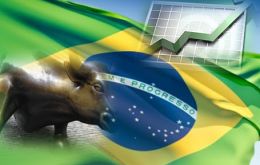MercoPress. South Atlantic News Agency
Tag: economy
-
Tuesday, May 3rd 2011 - 05:05 UTC
Argentine economy forecasted to grow 6.5% according to Central bank

The Argentine economy is poised to expand by 6.5% or more this year, and unemployment may hover at the lowest level in two decades, the central bank said.
-
Monday, May 2nd 2011 - 00:21 UTC
China’s manufacturing slows down in April, according to official data

China's manufacturing growth slowed in April, according to official figures. The country's purchasing managers' index (PMI), which is designed to provide a snapshot of conditions in the manufacturing sector, fell to 52.9 in April, from 53.4 in March.
-
Wednesday, April 27th 2011 - 11:11 UTC
Brazil’s strong currency fuels current account deficit in March

Brazil's current account deficit ballooned to a record for the month of March as foreign companies in Brazil sent more profits home and Brazilians spent more on travel and goods overseas.
-
Friday, April 22nd 2011 - 04:48 UTC
Car companies comply with Argentina’s import/export balance policy

Argentina reached an agreement with the French conglomerate Peugeot-Citroen and the importers of Italy’s Alfa Romeo, to balance imports-exports value, following on Argentina’s latest regulations for the country’s auto industry.
-
Tuesday, April 19th 2011 - 02:09 UTC
Argentina’s economic activity indicator jumped 8.7% in February

Argentina's February monthly economic activity indicator, or EMAE, jumped 8.7% on the year and was up 0.4% on the month, the national statistics agency Indec reported Monday. The EMAE comprises most components of gross domestic product.
-
Saturday, April 16th 2011 - 00:13 UTC
Argentine economy forecasted to expand 8% in 2011 with inflation ranging 25%

Argentina’s 2011 economic growth forecast was raised to 8% from 5% by Nomura Securities International based on a strong surge from domestic demand and rising commodity prices. Government primary spending is expected to continue since 2011 is electoral year.
-
Friday, April 15th 2011 - 05:31 UTC
China’s March inflation fastest since 2008; further tightening anticipated

Inflation in China accelerated in March to the fastest rate since 2008, despite government efforts to cool prices. Consumer prices rose by 5.4% in March compared with a year earlier, the National Bureau of Statistics said. In February, the annual figure was 4.9%.
-
Wednesday, April 13th 2011 - 04:07 UTC
John Perkins latest book, the challenge of a blueprint for a new global economics

By David Michaels (*) “Hoodwink” is John Perkins latest book and a blueprint for a new form of global economics, far from predatory capitalism that must put an end to the old formula of “the few benefiting at the expense of the many”.
-
Tuesday, April 12th 2011 - 03:57 UTC
Germany and US leading global recovery with ‘robust expansion’, says OECD

The growth outlook for major industrialized economies is improving with Germany and the United States leading the recovery, the OECD's leading indicator for February showed.
-
Monday, April 11th 2011 - 06:04 UTC
Unemployment in Latam to remain strong into 2012 because of ‘uncertainties’

An estimated 17 million people will suffer unemployment in Latin America well into 2012 according to latest estimates from the Economic Commission for Latin America and the Caribbean, ECLAC.
